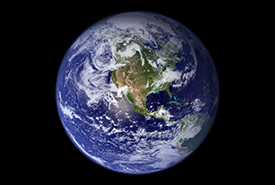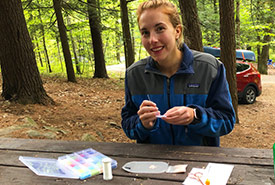What Earth Day means to me as a Haudenosaunee woman

Earth (Photo by NASA, CC0)
For many people, Earth Day occurs each year on April 22. It’s one day out of 365 that celebrates this planet and all that it sustains. While I too recognize and celebrate this day, my appreciation for the land extends far beyond these 24 hours.
As an Indigenous, more specifically Haudenosaunee, woman, Earth Day for me is every day. My identity, culture, the Kanien’kéha language, our traditions and stories are all based on the land and how Mother Earth has and continues to support us. When I partake in any aspect of my culture, I think of and reflect on nature. From dancing to singing, to beading, to storytelling, it’s all deeply rooted in the Earth.

Inspiration from my work comes from Mother Earth; from the sea, to the forest, to wildlife. (Photo by Chase Wastesicoot)
While each Indigenous person connects to their identity in their own ways, for me, I feel mostly guided by nature. Not only does time in nature have proven health benefits for both Indigenous and non-Indigenous peoples, but there is a cultural healing quality within the land that has existed for Indigenous Peoples since time immemorial. For example, the four sacred medicine plants (tobacco, cedar, sage and sweetgrass) all have their own stories and purpose in living a wholistic life as an Indigenous person on Turtle Island. Even before Creator gifted us these plants, Creation for many Indigenous cultures in itself is rooted in the land — without it, we wouldn’t exist.
As Indigenous Peoples, we live in reciprocity with the land. It’s a relationship that we depend on for cultural survival. There are many traditions and ceremonies that depend on the land and the species it sustains. For example, cultural practices such as basket weaving depend on the existence and good health of tree species, such as black ash and birch. Other cultural practices like beading use materials from the land, like fur from caribou, hide from moose and deer, and porcupine quills. Learning to live on, with and for the land is essential when passing down the cultural practices and stories that we tell about our histories and our hopes for our future on Turtle Island. When the land thrives, we as Indigenous Peoples thrive.
The most important relationship in my life is the one I have with nature. It is my hope this Earth Day and beyond that all people — Indigenous and non-Indigenous — find their own personal connection with the land and why it’s so important to protect it for the future.




